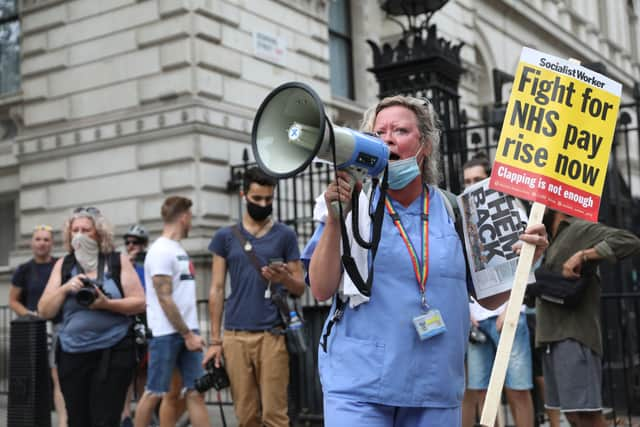Nursing strike: Union warns patient safety ‘being compromised’ by lack of staff
and live on Freeview channel 276
A nursing union set to launch strike action this December has warned patient safety is being “compromised” by low levels of staffing.
The Royal College of Nursing (RCN) has announced its first phase of strike dates on Thursday, December 15, and Tuesday, December 20.
Advertisement
Hide AdAdvertisement
Hide AdNurses say the dispute is not only over pay - but also fears over patient safety.
The RCN says: “Staffing levels are so low that patient care is being compromised.
“Only by paying nursing staff fairly will we recruit and retain people in our profession.”


The vote to strike in England, Wales and Northern Ireland came after the UK government turned down the RCN’s offer of negotiations, the union said.
Advertisement
Hide AdAdvertisement
Hide AdEmployers where strike action will take place will be announced next week.
RCN general secretary Pat Cullen said: "Ministers have had more than two weeks since we confirmed that our members felt such injustice that they would strike for the first time.
"My offer of formal negotiations was declined and instead ministers have chosen strike action.
“They have the power and means to stop this by opening serious talks that address our dispute.”
Advertisement
Hide AdAdvertisement
Hide AdShe added: "Nursing staff have had enough of being taken for granted, enough of low pay and unsafe staffing levels, enough of not being able to give our patients the care they deserve."
Further strike dates could be announced after the initial round, the RCN said, while not all union members at employers where there is a strike mandate will be called on the first dates.
Members at the majority of NHS employers across the UK voted to strike in a recent ballot.
Strike action in Scotland has been paused after the RCN and the government agreed to return to negotiations, while Welsh ministers have not yet agreed to meet with the union and there is no functioning government in Northern Ireland due to a dispute over power sharing.
Advertisement
Hide AdAdvertisement
Hide AdMore details on how the RCN will stage “safe and effective strikes” and maintain life preserving services are yet to be released by the union.
Health secretary Steve Barclay said: “I am hugely grateful for the hard work and dedication of nurses and deeply regret some union members will be taking industrial action.
“These are challenging times for everyone and the economic circumstances mean the RCN’s demands, which on current figures are a 19.2% pay rise, costing £10bn a year, are not affordable.
“We have prioritised the NHS with an extra £6.6 billion, on top of previous record funding, and accepted the recommendations of the independent NHS Pay Review Body to give nurses a fair pay rise of at least £1,400 this year.
Advertisement
Hide AdAdvertisement
Hide Ad“This means a newly qualified nurse will typically earn over £31,000 a year – with more senior nurses earning much more than that – they will also receive a pension contribution worth 20% of their salary.
“Our priority is keeping patients safe. The NHS has tried and tested plans in place to minimise disruption and ensure emergency services continue to operate.”
NHS England declined to comment.
Comment Guidelines
National World encourages reader discussion on our stories. User feedback, insights and back-and-forth exchanges add a rich layer of context to reporting. Please review our Community Guidelines before commenting.
